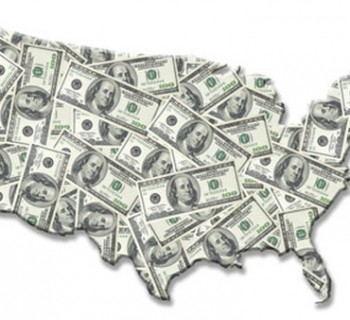 Figuring out where your retirement dollars will go furthest just got a little easier. For the first time, the Commerce Department’s Bureau of Economic Analysis released price-adjusted estimates of personal income for states and metropolitan areas. Their price parity report illustrates the difference in costs of various goods and services between states. The BEA data along with current state income tax rates can help retirees compare various retirement destinations to determine the areas where their income will provide the most attractive lifestyle. Since many retirees rely on a fixed income such as a pension or Social Security for a large portion of their income, avoiding states with higher taxes and living expenses may help your income go further, thus improving your lifestyle. While there are many factors to consider in addition to expenses and taxes, retirees may want to think twice before considering retirement in the states noted below.
Figuring out where your retirement dollars will go furthest just got a little easier. For the first time, the Commerce Department’s Bureau of Economic Analysis released price-adjusted estimates of personal income for states and metropolitan areas. Their price parity report illustrates the difference in costs of various goods and services between states. The BEA data along with current state income tax rates can help retirees compare various retirement destinations to determine the areas where their income will provide the most attractive lifestyle. Since many retirees rely on a fixed income such as a pension or Social Security for a large portion of their income, avoiding states with higher taxes and living expenses may help your income go further, thus improving your lifestyle. While there are many factors to consider in addition to expenses and taxes, retirees may want to think twice before considering retirement in the states noted below.
New Jersey
It probably comes as no surprise that the Garden State has been honored yet again as one of the most expensive states in the country to live and retire in. According to the BEA report, it costs 14.1 percent more to call New Jersey your home than the average state in the country. New Jersey’s personal income tax system consists of six brackets and a top rate of 8.97 percent, ranking it sixth-highest among states levying an individual income tax. According to the Tax Foundation, New Jersey’s state and local governments collected about $2,893 per person in property taxes, which ranks highest nationally.
With federal and state taxes as significant as they are, it can take a long time to effectively pay off your tax bill. In 2014, the Tax Foundation suggests that New Jersey taxpayers worked until May 9 (the longest nationally) to pay their total tax bill — ouch. In other words, it takes working four months and nine days of the year for the average New Jersey resident to pay his or her annual tax bill. While it is clearly expensive to live in New Jersey, an inheritance tax of 11 to 16 percent (only certain beneficiaries are affected) and an estate tax of up to 16 percent on estates valued at greater than $675,000 can make New Jersey an expensive place to pass away, too.
New York
While costs will vary greatly within the state, the BEA report states that the New York is 15.4 percent pricier to live in than the average state in the nation. According to the Tax Foundation, the eight brackets that make up New York’s personal income tax system top out at 8.82 percent, ranking it eighth-highest. While the sales tax rate of 4 percent is 3 percent lower than New Jersey’s 7 percent, it still remains an added expense. Additionally, state and local governments collected approximately $2,335 per person in property taxes in New York, ranking it fourth-highest nationally.
So how long does it take for the average New Yorker to pay his or her tax bill? Well, according to the Tax Foundation, it takes until May 4 (third-longest nationally) to pay it off. Finally, while there is no inheritance tax, estates greater than $1 million that are not left to a spouse are taxed at a top rate of 16 percent in New York.
California
With living expenses reported to be 12.9 percent higher than average by the BEA report, it is a good thing the Golden State has some great weather to offer as it can be quite pricey for retirees. California’s personal income tax system consists of 10 brackets with a rate that tops out at a whopping 13.3 percent, ranking highest among states — yikes. While California’s real estate tax ranking is a bit better with $1,426 in per person property taxes (19th nationally), the Tax Foundation notes that it still takes the average Californian until April 30 to pay off his or her total tax bill — fourth-worst in the nation. While there is no estate tax in the state, California residents still face a stiff 7.5 percent sales tax, making it less than attractive financially.
Rhode Island
While the cost of living in Rhode Island is about average based upon BEA reports, the tax climate in the state offsets many of those benefits for retirees. In fact, Rhode Island is one of only a handful of states that tax Social Security benefits. While Rhode Island’s top tax rate of 5.8 percent ranks it 24th-highest, the fact that it taxes nearly all sources of retirement income including pensions helped it land on this list. Rhode Island’s property taxes are stiff with state and local governments collecting about $2,162 per person in property taxes, ranking it seventh-highest nationally.
The Tax Foundation also notes that it takes until April 27 on average for residents to pay their total tax bill. Finally, with a sales tax of 7 percent and an estate tax of up to 16 percent, Rhode Island can be a pricey retirement destination. When planning for retirement, the further your money can take you, the better. Thinking twice before retiring in the priciest states can help ensure that you have the best chance of maintaining the retirement lifestyle you are pursuing. Of course other factors such as proximity to family, friends and desirable weather must be factored in, too. Consider visiting taxfoundation.org and bea.gov to help identify more cost-effective options. Since everyone’s situation is unique, consider speaking to your tax and financial adviser to determine the best approach for you.
Kurt J. Rossi, MBA, is a Certified Financial Planner Practitioner and Wealth Advisor.
He can be reached for questions at (732) 280-7550, kurt.rossi@Independentwm.com or
www.Independentwm.com. LPL Financial Member FINRA/SIPC








